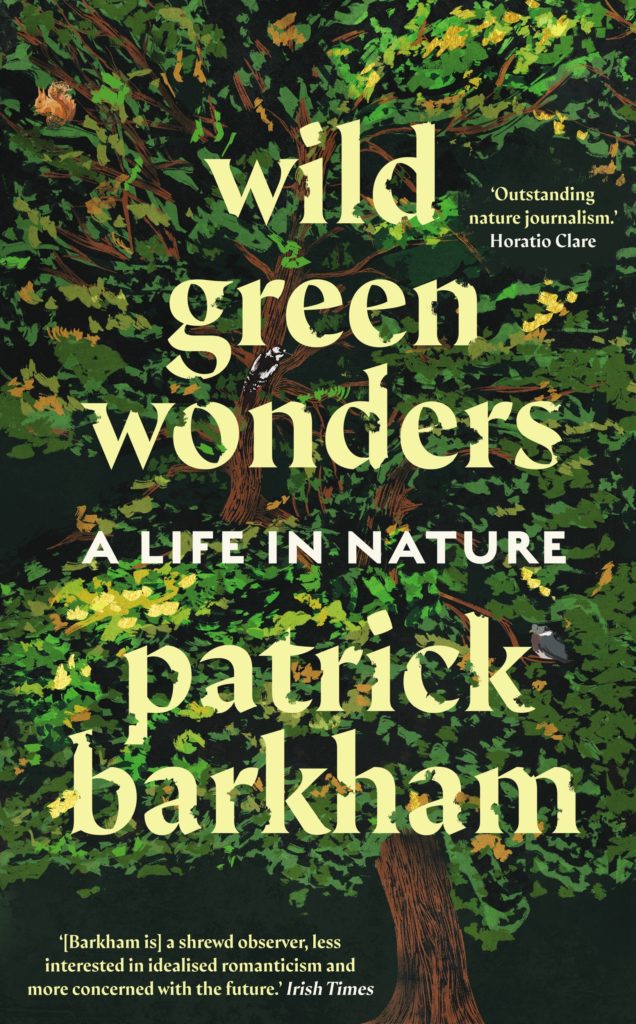‘Wild Green Wonders: A Life in Nature’, published tomorrow by Guardian Faber, collates 20 years’ worth of Patrick Barkham’s writings for The Guardian. Sue Brooks reviews, finding kindness, wonder and a delightful cast of mavericks between its pages.

Patrick Barkham is a fortunate man. In 2013, having published his second book (Badgerlands), he was tempted to give up his reporter’s job at The Guardian and become a full-time author — but a kind editor intervened. Would he like to work part-time as the paper’s Natural History Writer? Commissions would take him into obscure corners and far-flung places, meeting extraordinary people and the creatures they cared about, while pursuing his own longer journeys. An irresistible offer which has produced three more books, and this wonder-filled selection of articles written for The Guardian in the last two decades.
Rather than a strictly chronological order, the pieces are grouped into six sections, and each one carries a title cleverly adapted from the one in the original print version. One way of reading, as I did initially, would be to pick out a title which intrigues. On safari in the Essex rainforest for example (Canvey Wick, one of the smallest and most precious reserves managed by Buglife, where almost 2,000 invertebrates have been recorded), or Play God with small things (the reintroduction of the fen raft spider on Strumpshaw Fen) or, my favourite as a fellow butterfly enthusiast, The Introducionists: a maverick rebellion on extinction. I loved this piece when it appeared in The Guardian in 2020, telling the story of Martin White, who devoted his life to breeding and releasing native butterflies in carefully chosen locations in order to redress their decline. Something abhorrent to most conservationists.
In a beautiful meadow filled with wild flowers and birdsong, a man of late middle age wearing a faded camouflage sun hat, knelt beside a clump of clover and prepared to break the law.
Within a year, Martin White was dead, from cancer induced by the insecticide he needed to preserve butterflies for his collection, before he turned to breeding. The irony was not lost on this proud and very private man, but he had no regrets — my life hasn’t been a waste…I like to think I’m leaving some sort of legacy. He trusted Patrick, and together they visited the secluded meadow where the rare mazarine blue butterfly had been released. Probably the last journey Martin White made before his death on October 12th 2020. With his agreement, Patrick had written the obituary and it was published in The Guardian the following day. It felt at the time like journalism of a very high order, by the newspaper and the Natural History Writer, and it still does.
It illustrates one of Patrick’s great qualities — the ability to form relationships with people who live quite solitary lives. Good journalism, he says is mostly about listening. And, I would add, asking the right questions and letting the person’s voice speak for itself. Listen to Ronald Blythe’s musings, aged 89 and living alone in the remote farmhouse he inherited from the artist John Nash — I just tumbled into these places and stayed. I like routine and solitude and the kind of order of reading and thinking and drifting…
Stephen Grendon, the hermit of the Cotswolds, is another. In his early forties and suffering from chronic depression, he chooses to live in a small hut on a patch of rough ground with no running water or sewerage, preferring the natural world to the human one. On Patrick’s first visit in 2006, planning regulations in an AONB had caught up with him and he was fearful of eviction. The postcript in 2021 highlights the remarkable changes that have taken place in planning over the last two decades. The Welsh Government has introduced the One Planet development policy, and Cotswold District Council has given approval to Stephen Grendon remaining in his home, as long as it is entirely for his own use and cannot be passed on to anyone else.
Patrick is never shy of controversy. I always learn something new when I listen to other voices…I like to pay close attention to divergent views. Reading his reporting of hen harrier deaths, or the passionate arguments around saving the red squirrel or the culling of wolves in Northern Scandinavia, is an education of the best kind, in the fine Guardian tradition of investigative journalism — told by the people on the front line.
Those Guardian readers who are already familiar with Patrick Barkham’s writing will know this. But newsprint, in my experience at least, (with one or two rare exceptions…) is easily scattered in the memory. To have a varied collection of pieces to dip into is a treat. Patrick knows how to tell a good story, and that combination of kindness, wonder and good fortune that seems to be present in his own life shines through.
The Future of Nature…? We are gently nudged towards optimism. The mavericks are there — Martin White and Derek Gow — and the enduring and inspiring success of the Knepp Estate, but the last word goes to teenagers, entranced, as Patrick Barkham was as a boy, by the more-than-human world. Newt kids on the block are the flagbearers we can trust.
*
‘Wild Green Wonders’ is published tomorrow. Buy a copy here (£13.94).
Patrick reads from the book, as well as interviewing Peter Riley about his book ‘Strandings’ (our current Book of the Month) at our event at The Social, London, on Monday 7 March. More information/tickets here.